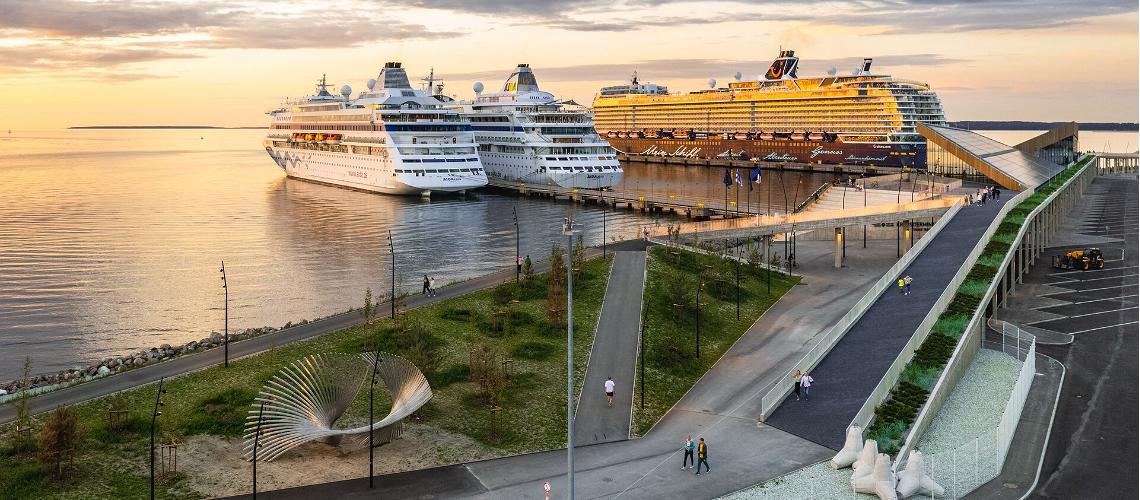TALLINN: THE GREEN CAPITAL OF EUROPE 2023
Estonia’s capital city, Tallinn, will become Europe’s 13th Green Capital in January 2023, with a goal of becoming a model city for sustainable governance.
As one of the best-preserved medieval cities in Europe and a UNESCO World Heritage Site, Tallinn is characterised by the diverse nature of its landscapes and communities, which are home to rare plant and animal species.
Tallinn impressed the international jury with a systemic approach to sustainable governance and interlinked strategic goals, which reflect the ambitions of the European Green Deal and UN’s Sustainable Development Goals.
Since the beginning of 2022, Tallinn has been leading the European Network of Sustainable Cities, implementing the UN Sustainable Development Goals at a local level. In 2013, Tallinn became the first city to introduce free public transport to all residents following a referendum.
By 2035 the city intends to have free carbon-neutral public transport and wants to achieve full climate neutrality by 2050.
During its Green Capital Year, Tallinn’s main themes are biodiversity, reducing the carbon footprint and sustainable governance. The goal is to involve Tallinn’s communities more in the city development, to find opportunities to support and implement green innovation, develop carbon neutral mobility and circular economy and help city residents better understand the importance of environmental protection. There will be a number events throughout the year to celebrate its title and to showcase its approach to sustainability, starting with the opening ceremony in January and leading up to a green innovation expo in the Autumn.
Mayor of Tallinn, Mihhail Kõlvart, sayid: “We are delighted that Tallinn has been recognised for its efforts in creating a more environmentally friendly city and are honoured to be awarded the European Green Capital for 2023. Interestingly, the idea of a European Green Capital was born in Tallinn in 2006 and 15 cities signed a memorandum for the title of European Green Capital here. During our Green Capital year we want to initiate change and new sustainable activities, accelerate eco-innovation and green growth and engage citizens and organisations in order to create a better living environment for all”.
Tallinn has more than 2,100 hectares of protected areas – nature reserves, protected parks and even an island. Tallinn is also one of the few capital cities that has its own bog and probably the only one where Scottish Highland cattle are employees of the city. This is just one of Tallinn’s many projects for restoring and protecting the biodiversity of coastal meadows.
Tallinn’s 2023 Initiatives
Tallinn is planning a variety of green projects in recognition of its responsibility to protect the planet and to create a stable environment for generations to come. Here are three example projects planned for 2023
- Mobility
Tallinn aims to achieve carbon-neutral, free public transport by 2035. To reach that goal, the city is investing in new tram lines and electrical buses and rethinking city planning to include an additional 40 kilometres of bicycle lanes. The safety of existing cycle paths and roads in Tallinn will also be improved by gradually creating a network of safe elevated cycle paths physically separated from the pavements of the city centre. The aim is to make Tallinn a 15-minute city, meaning that key facilities – workplaces, shops, entertainment, and education – should be reachable from any part of Tallinn within 15 minutes on foot or by bicycle. Already, all trams in Tallinn run on 100% renewable electricity.
 Cruise Terminal Tallinn (Photo by: Kaupo Kalda)
Cruise Terminal Tallinn (Photo by: Kaupo Kalda)
- Pollinator Highway
This is a sustainable and vibrant linear 13-kilometre park that champions the co-existence of biodiversity and urbanisation. The Pollinator Highway – Putukäväil – will pass through nine districts, starting from an urban forest area and ending in a garden city, reaching from a species-rich alvar to various industrial areas, all the while connecting Tallinn’s most distant parts with the heart of the city.
Klint Park is another green corridor connecting three of Tallinn’s districts together. This nine-kilometre unique park area runs along a limestone cliff and will be transformed into a coherent and integrated recreational area for all. The cliff has many different habitats including several protected plant and bird species. The aim is to create an environment where people have rest areas, but at the same time there is very little interference with nature.
Eco Innovation
Despite its small size, Tallinn is a major start up hub and home of Skype and Bolt. Estonia has the largest number of unicorns per capita in the world and since 2005, a unicorn has been established in Estonia every two years. Many innovative Smart City projects are being launched throughout 2023.
To encourage this innovation, Tallinn has moved towards a more systematic and practical partnership with universities and companies, that want to test new environmentally friendly technologies and concepts in Tallinn. “Think globally, test in Tallinn” is the motto to encourage companies to test their smart and eco-friendly products and services in a city environment.
At the end of 2023, Tallinn will also host an international Green Expo to showcase sustainable innovation for cities.
